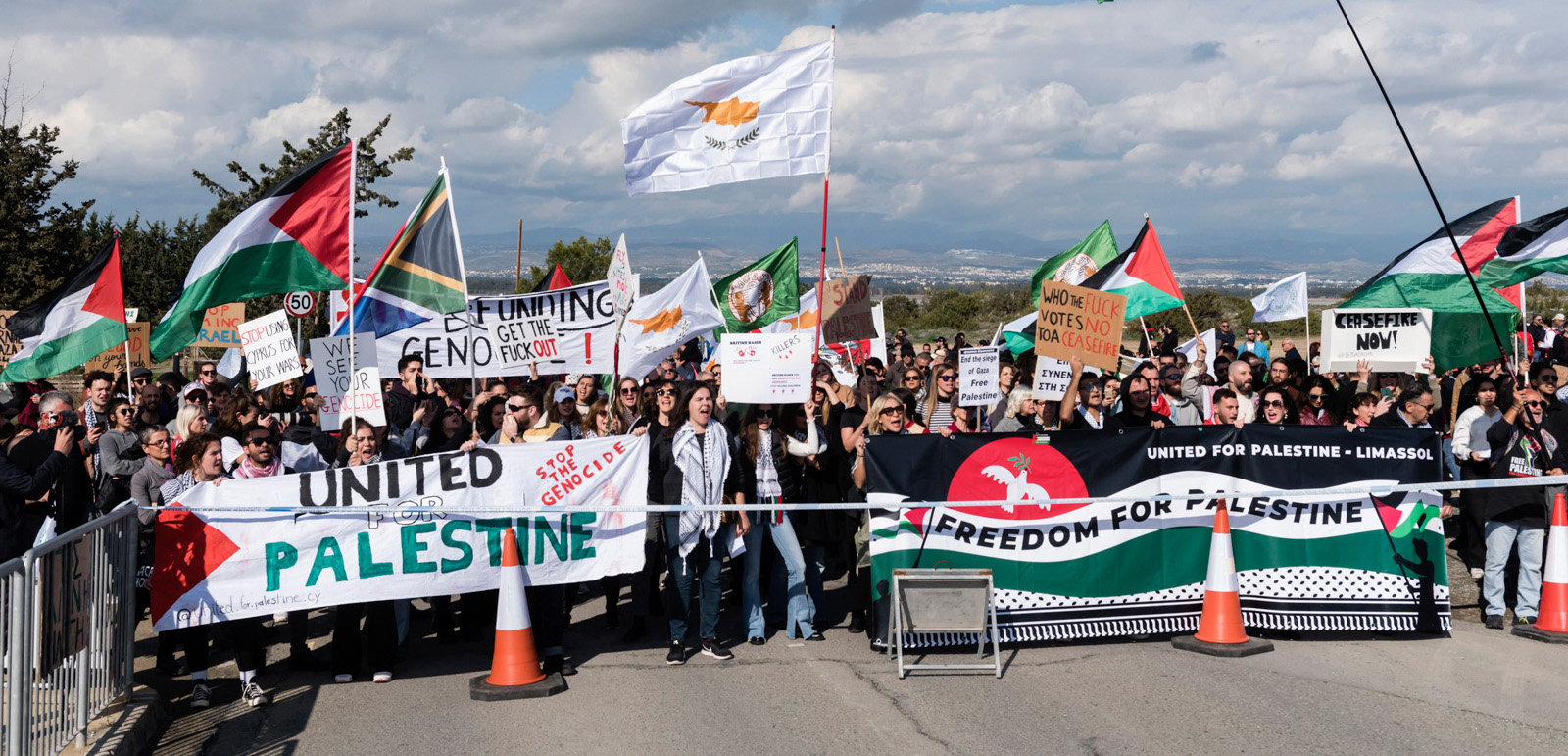The UK’s use of its Cyprus airbases to engage in Middle East conflicts is sparking angry protest
Reports that the British military is arming Israel’s war in Gaza from its Cypriot hubs have prompted calls for its bases to be closed permanently
–

The use of British military bases on Cyprus to allegedly funnel weapons to Israel for its bloody war in Gaza has sparked angry protests with Cypriot activists demanding the facilities be dismantled.
Demonstrators across the divided Mediterranean island have gathered outside RAF Akrotiri to call for an end to the installations being increasingly used in Middle East war operations – including strikes on Houthi targets in Yemen.
“We know what conflict means here,” said Murat Kanatli, who heads the small New Cyprus Party in the self-declared Turkish Republic of Northern Cyprus. “We’ve been at the coalface of war. We have memories of what happened in 1974 and are against the bases being used in this way,” he added, referring to Turkey’s invasion of Cyprus after the island’s majority Greek population attempted to unite with Greece. Nine years later, the Turkish north unilaterally proclaimed itself an independent state.
Like other protestors, Kanatli fears the backlash that the EU’s most easterly member could suffer in retaliation for British military activity given its proximity to the Middle East. Cyprus – now split between Greek Cypriot Orthodox Christians in the south and Muslim Turkish Cypriots in the north – lies just 140 miles away from the Syrian coast.
“Our country is very close and could easily become a target. What I’m saying is not theoretical. A missile exploded here in 2019,” he said, referring to an incident in which a projectile fired by Syrian forces in response to an Israeli air strike hit a Cypriot mountainside.
Earlier in January, Britain’s ministry of defence released images of RAF Eurofighter Typhoon jets, equipped with laser-guided missiles, taking off from Akrotiri as the latest Anglo-American airstrikes against Houthi strongholds in Yemen got underway in retaliation for attacks by the Iran-aligned group on merchant ships in the Red Sea.
While US Central Command described the strikes as successful, Houthi rebels vowed instant reprisal.
Writing on X, a senior member of the group’s Revolutionary Committee, Mohammed Ali al-Houthi, said: “Trust well that every operation and every aggression against our country will not be without a response.” In another X post, Mohammed Al-Bukhaiti, a spokesperson for the movement, wrote: “The American-British aggression will only increase the Yemeni people’s determination to carry out their moral and humanitarian responsibilities towards the oppressed in Gaza.”
A legacy of years of colonial rule when Britain had military garrisons across the Mediterranean Sea – in Gibraltar, Malta and Cyprus – RAF Akrotiri is one of two British bases on the island, along with the larger Dhekelia Eastern Sovereign Base Area. Accounting for 98 square miles of the nation’s territory, both are key to British intelligence gathering in the Middle East.
Under the terms of the facilities’ establishment, drawn up when Cyprus gained independence from British rule in 1960, the UK retains control over the bases and is not bound to inform Cypriot officials about activities on them, although the island’s leader, president Nikos Christodoulides, was briefed ahead of the first strikes against Houthi-controlled areas of Yemen on 12 January.
In an official visit to the war-split capital Nicosia last week Britain’s defence secretary Grant Shapps attempted to douse the growing security fears of Cypriots. “We want to do everything possible to ensure the security of Cyprus, which is in everyone’s best interests,” he said after meeting Christodoulides who heads the internationally recognised Republic in the Greek-administered south. “We appreciate that you are in a difficult neighbourhood and want to do everything possible to make it easier.”
But in the island’s north, Turkish Cypriot leader Ersin Tatar has been vocal in expressing disquiet over the role the bases have played since the 7 October Hamas attack triggered Israel’s brutal offensive in Gaza. Noting the increased number of RAF transport aircraft making the 40-minute journey to Tel Aviv, Tatar told Turkey’s state-run Anadolu news agency that what the UK was doing was tantamount to “interfering in another country’s affairs by using these bases”.
“As a respected state, the United Kingdom should not support such a massacre,” he said citing reports that weaponry was being shipped to the bases from depots across Europe before being flown to Israel to bolster its war machine. “Both the Turkish Republic of Northern Cyprus and the Greek Cypriot side will definitely not approve of the island being used as a tool for Israel’s oppression of Palestine … it saddens us that Cyprus, the land in which we were born and grew up, our homeland, is being used … for such brutality.”
Following the demonstration at Akrotiri a spokesman for the UK’s Ministry of Defence denied that military aircraft – including scores of US air force heavy transport planes spotted landing at the base days after the start of the Gaza conflict – were carrying “lethal cargo”. But other officials in both London and Washington have repeatedly refused to be drawn on questions regarding the use of the bases by allied forces, not least the US.
Amid fears of the conflagration spreading across the region, activists have deplored the secrecy that shrouds military operations at the installations. “There is so much they don’t say but actions speak louder than words,” said Tassos Costeas, president of the bi-communal Cyprus Peace Council which organised the airbase protests. “The bases shouldn’t be on our island and it’s outrageous that these strikes [against Yemen] are taking place without UN Security Council approval. Other protests, for sure, will follow.”
Topics
Get the Hyphen weekly
Subscribe to Hyphen’s weekly round-up for insightful reportage, commentary and the latest arts and lifestyle coverage, from across the UK and Europe
